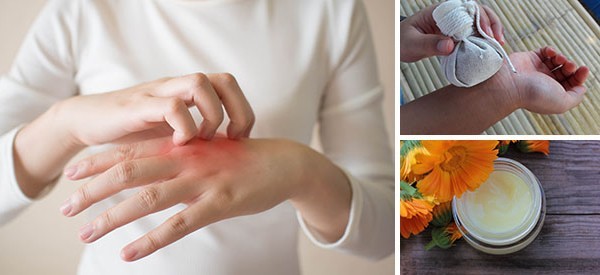
How To Treat Eczema Naturally
Anyone who has dealt with eczema, or treated family members with eczema, knows how frustrating and painful it can be. The incessant scratching – day and night. The interrupted sleep. The embarrassment. The constant effort to manage it.
It’s a condition that has no hard and fast cure, and so many factors can cause it to flare up, and usually at the most inconvenient moments.
There are a number of suspected causes for an eczema flare up, and since everyone reacts differently, it can be difficult to isolate the exact trigger. Below are some of the common causes, plus ways to reduce the severity of eczema naturally.
Damage to the skin and inflammation
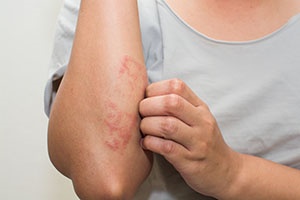 Eczema causes the skin barrier to degrade, preventing it from retaining moisture and making it prone to infection. For this reason, moisturizing regularly is an important ritual for eczema sufferers, and there are some herbal treatments that can be easily made and applied at home.
Eczema causes the skin barrier to degrade, preventing it from retaining moisture and making it prone to infection. For this reason, moisturizing regularly is an important ritual for eczema sufferers, and there are some herbal treatments that can be easily made and applied at home.
The menthol in diluted peppermint, eucalyptus and tea tree essential oil, for example, can help to cool and sterilize the skin, as well as reduce the pain and itchiness. When you combine this with beeswax, and the antiseptic and anti-inflammatory properties of coconut and sunflower oil as carrier oils, you can make a homemade eczema balm or salve.
Salves and balms don’t contain any water, so they don’t require any preservatives to be added. Lotions, on the other hand, need to have preservatives, since mold and bacteria will start to grow due to the high water content. Otherwise you will have to store homemade lotions in the fridge and use them within 4 weeks.
You can target the inflammation with plenty of other herbs from the garden, such as calendula, lavender, sage, marshmallow root, chamomile, or grow your own aloe vera plant to apply directly to the skin.
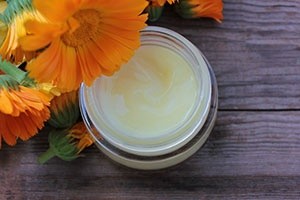 To make a cooling salve or balm for eczema, you will need the following items and ingredients;
To make a cooling salve or balm for eczema, you will need the following items and ingredients;
- Calendula, lavender, sage, marshmallow root and chamomile (or any combination of these herbs to make an herbal oil).
- Coconut or sunflower oil.
- A glass jar to make the herbal oil, and some small glass jars for the salve.
- Double boiler (or a pot of water with a jar sitting in it).
- Peppermint, eucalyptus and tea tree essential oils.
- Approximately 60 grams or 2 ounces of beeswax.
The first step is to make your herbal oil.
- Harvest a handful of calendula, lavender and chamomile flowers while fresh (and sticky), as well as a couple of sage leaves and a sliced marshmallow root (or use dried herbs).
- Place the herbs into a small glass jar and fill with either coconut or sunflower oil. Leave for 4 weeks in the sun or place over a very low heat for 1 – 2 hours.
Now you can make your eczema salve or balm.
- Pour ¾ cup of your herbal oil into a double boiler.
- Add 1 ounce of beeswax to the herbal oil first, and then gradually add the remaining ounce while stirring.
- Put a small amount of the mixture on a cold tablespoon to test the consistency. If it’s too hard, add more herbal oil a few drops at a time. If it’s too soft, then add some more beeswax.
- Next stir in 2 – 3 drops of each essential oil. Peppermint, eucalyptus and tea tree essential oils are much stronger than other oils, and need to be diluted before rubbing onto your skin.
- Quickly pour your warm salve into small jars and use for up to a year.
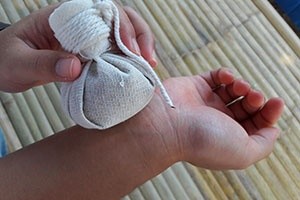 You can also use any of these herbs straight from your garden to make a wet wrap or compress to sooth irritated skin;
You can also use any of these herbs straight from your garden to make a wet wrap or compress to sooth irritated skin;
- Harvest some calendula, lavender and chamomile flowers, as well as a handful of sage leaves and 2 sliced marshmallow roots (or use dried herbs) and place into a bowl.
- Pour boiling water over them and allow to brew for at least 15 minutes.
- Once it has cooled you can strain it.
- Moisten strips of cloth or bandages in the brew and then wrap around the affected areas.
If you are trying to treat eczema on your hands or feet, then a pair of cotton gloves or socks make great wet wraps.
Keeping moisturizers and lotions in the fridge can provide cool relief immediately.
Diet, nutrition and gut health
Eczema may be triggered by a food allergy that you aren’t aware of. Some people have reported a substantial improvement in their eczema after they eliminated certain types of food, particularly dairy, yeast or gluten, so it was more than likely a food allergy that caused their skin condition.
You can do an elimination diet at home by removing all suspected food allergens from your diet for 3 weeks, and then over the next couple of weeks, you slowly introduce each one again to see if your eczema reacts to any of them.
 Removing all allergens from your diet at once can be daunting, so the alternative is to go to a doctor to get a skin prick test to figure out whether the cause of your eczema is one of the 50 allergens they can test for.
Removing all allergens from your diet at once can be daunting, so the alternative is to go to a doctor to get a skin prick test to figure out whether the cause of your eczema is one of the 50 allergens they can test for.
Many herbalists believe that eczema is a symptom of an underlying digestion problem. They will often treat the external eczema in addition to improving gut health and eliminating toxins. It is often recommended to increase the amount of fiber and water in your diet, as well as to eat foods that aid digestion and the liver, such as turmeric, ginger, lemon, marshmallow root and aloe vera.
Other diet changes that might help to control the symptoms of eczema is to eat more foods that are known to have anti-inflammatory, antioxidant and probiotic properties. Most fruit and vegetables are high in anti-inflammatories, as well as walnuts. Berries, nuts and leafy greens are high in antioxidants, while yogurt and fermented foods such as sauerkraut and kimchi are good sources of probiotics.
Drinking plenty of water helps the skin stay hydrated.
Chemicals and irritants
A flare up can be triggered by a reaction to an irritant like a harsh chemical. Using cleaning agents and chemicals can often cause contact dermatitis, especially with regular or prolonged exposure.
Most soaps, detergents and lathering agents are alkaline, which can be harsh on our acidic skin. Switching to a milder, fragrance-free soap and laundry detergent can help to avoid skin irritants. Don’t use fabric softeners, since these tend to leave a residue on your clothes.
Lack of vitamin D
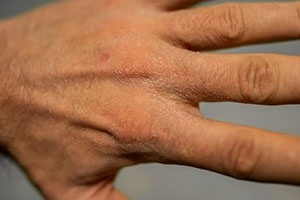
There is a link between a lack of vitamin D and the occurrence of eczema, however, it’s not known whether the former causes the latter.
Even so, occasionally getting out in the sun for short periods to boost your vitamin D levels might help with your treatment, but ensure you don’t damage the skin further by tanning or burning the irritated skin.
Stress
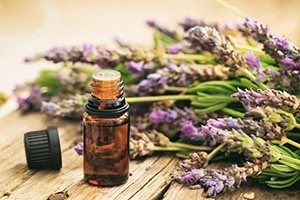 Stress is a trigger for eczema flare ups for many people. Meditation, exercise, tai chi, yoga, massage, acupuncture, and aroma therapy can all help with de-stressing.
Stress is a trigger for eczema flare ups for many people. Meditation, exercise, tai chi, yoga, massage, acupuncture, and aroma therapy can all help with de-stressing.
Lavender essential oil can be one of the best choices for people with a skin condition. It helps you to relax when used in aroma therapy and massage, and it can also treat inflammation and infection when applied topically.
Changes in the climate and weather
Winter and summer can be especially difficult for people with skin conditions. Extreme heat and cold can dry out the skin, so it’s important to always apply moisturizer. Sweating and prickly heat can also cause an eczema break out, so exercise either in climate-controlled spaces or during the cool of the day.
Bathing or showering habits
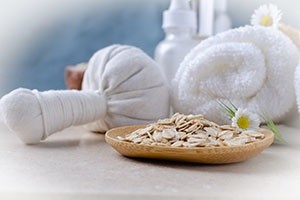 One old remedy for soothing a fierce itch is to add one cup of plain, organic, powered oatmeal (known as colloidal oatmeal) to a lukewarm bath and soak for no more than 15 minutes.
One old remedy for soothing a fierce itch is to add one cup of plain, organic, powered oatmeal (known as colloidal oatmeal) to a lukewarm bath and soak for no more than 15 minutes.
Rinse off afterwards and apply moisturizer. Don’t use breakfast oats, as these tend to have added sugar and preservatives. The finely ground oatmeal will also help to decrease the pH of your skin back to a normal level.
Some home remedies out there sound a little extreme. Adding bleach or apple cider vinegar to your bath to re-balance the acidity of the skin sounds like a possible treatment, but in reality, when you get an eczema flare up, even with the strongest willpower, the scratching often results in broken skin, which does not go well with acidic bath water. These treatments are not recommended for children.
It’s also advised to avoid long, hot showers, and always moisturize immediately after showering.
Find what works for your eczema
Once you understand what can trigger your eczema, and what can help prevent an outbreak, then managing it can be much more tolerable.
You may also like:
 Backyard Plants You Can Use For Skin Rashes
Backyard Plants You Can Use For Skin Rashes
Similar to Morphine: The Best Natural Painkiller that Grows in Your Backyard (Video)
How to Make a Healing Salve with Cabbage and Aloe Vera
How To Make a Powerful Calendula Extract to Keep in Your Medicine Cabinet (with pictures)

Have little sores on my head I’ve tried tea tree shampoos, vinegar shampoo, nothing works! It’s driving me crazy with the itching what can I use?
Hi Hazel,
Thank you so much for your comment.
I am so sorry that you have to go through this.
I advise you to massage your scalp with organic coconut oil or peppermint oil.
Additionally, use chemical-free shampoo and try washing your hair once a week.
God bless!
I have found in research that overactive yeast places a large portion in those scalp conditions. I recently dealt with overactive yeast and got a special antibiotic for it and my scalp has cleared as a side effect. More probiotics would also help from the inside. Having high blood sugar is also stimulating to yeast. Less sugar some of Nicole’s salve and Acidophilous or probiotics in a high amount ought to do the trick. I absolutely love my lost herbs book by you Nicole… it is going to help me with my new diagnosis of type 2 diabetes and high cholesterol. Blessings!
[…] How To Treat Eczema Naturally […]
In the paragraph regarding making the salve, it did not seem clear how to use the double boiler, as in- how long to boil, etc. Can you please elaborate?
My eczema is inside my ear and has started spreading on the outside but still in the ear area. Its very itchy most times and then it flakes off and its a constant battle to control it.
I would like to make the salve mentioned above but, you don’t give any specifics on how much to use of everything. I’m a beginner so I need more specific amounts. Can you help me with that?
Gina